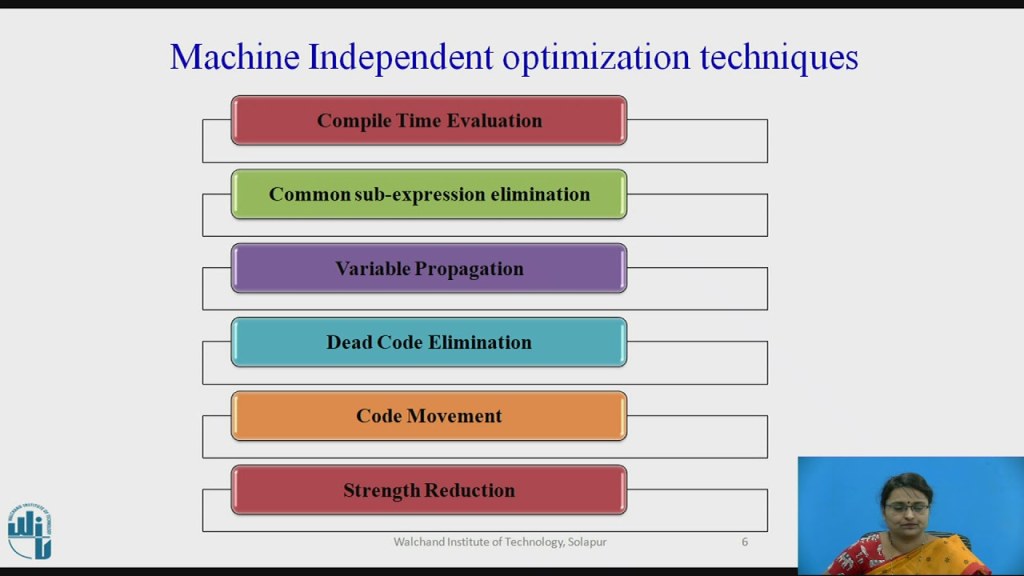Supercharge Your Code With Cutting-Edge Coding Optimization Techniques: Unlock Efficiency And Maximize Performance!
Coding Optimization Techniques: Achieving Efficiency and Performance
Greetings, Readers! Today, we will delve into the fascinating world of coding optimization techniques. In this article, we will explore the various strategies and methods that can be employed to enhance the efficiency and performance of your code. Whether you are a seasoned developer or just starting out, understanding and implementing these techniques can greatly benefit your projects. So, let’s dive in!
Introduction
The field of coding optimization revolves around improving the speed, efficiency, and overall performance of software programs. With the ever-increasing demand for faster and more responsive applications, it has become crucial for developers to optimize their code. By implementing optimization techniques, developers can reduce resource usage, minimize execution time, and enhance the user experience.
1 Picture Gallery: Supercharge Your Code With Cutting-Edge Coding Optimization Techniques: Unlock Efficiency And Maximize Performance!

In this article, we will cover a wide range of coding optimization techniques, including algorithmic optimizations, memory management, code refactoring, and more. These techniques are applicable to various programming languages and can be integrated into different types of projects, ranging from web development to mobile app development.
Now, let’s explore the key points we will discuss in this article:
The What: Understanding Coding Optimization Techniques
🔍 What are coding optimization techniques? These techniques involve analyzing and improving the efficiency and performance of code to achieve better results. They encompass a wide range of strategies, such as algorithmic improvements, memory optimization, and code refactoring.
Algorithmic Optimizations

Image Source: ytimg.com
Algorithmic optimizations focus on enhancing the efficiency of algorithms used within the code. By developing more efficient algorithms or optimizing existing ones, developers can significantly improve the overall performance of their software.
Memory Management
Efficient memory management plays a crucial role in coding optimization. By minimizing memory leaks, optimizing data structures, and utilizing memory efficiently, developers can reduce resource usage and enhance the speed and performance of their applications.
Code Refactoring
Code refactoring involves restructuring existing code to improve its readability, maintainability, and performance. By eliminating redundant code, optimizing data access, and enhancing code organization, developers can achieve cleaner and more efficient code.
Compiler Optimizations
Compiler optimizations refer to the various techniques employed by compilers to optimize the code during the compilation process. These optimizations can include inlining functions, loop unrolling, and dead code elimination, resulting in faster and more efficient executables.
Parallelization
Parallelization techniques involve dividing tasks into smaller subtasks that can be executed concurrently. By utilizing the potential of multi-core processors, developers can achieve significant performance improvements in their code.
Profiling and Benchmarking
Profiling and benchmarking techniques help developers identify performance bottlenecks and measure the impact of optimization efforts. By analyzing the execution time and resource utilization of different code sections, developers can prioritize their optimization efforts.
The Who: Who Can Benefit from Coding Optimization Techniques?
🎯 Coding optimization techniques are beneficial to a wide range of individuals, including:
Developers
By implementing coding optimization techniques, developers can improve the performance and efficiency of their code, resulting in faster and more responsive applications.
Project Managers
Project managers can benefit from coding optimization techniques by ensuring that their development teams follow best practices for efficient and optimized code. This can lead to cost savings, improved project timelines, and better overall project outcomes.
System Administrators
System administrators can optimize the performance of their infrastructure by implementing coding optimization techniques. By reducing resource usage and improving code efficiency, they can enhance the overall system performance.
End Users
End users are the ultimate beneficiaries of coding optimization techniques. Faster and more efficient applications result in improved user experiences, increased productivity, and higher satisfaction levels.
The When: When Should You Optimize Your Code?
⏱️ The timing of code optimization depends on various factors, including project requirements, performance goals, and development timelines. Here are some situations when you should consider optimizing your code:
Performance Bottlenecks
If your application is experiencing significant performance issues, such as slow response times or high resource consumption, it may be time to optimize your code.
Scalability Requirements
When your application needs to handle an increasing number of users or process larger datasets, optimizing your code becomes essential to ensure scalability and maintain performance.
Code Review and Maintenance
During code reviews and maintenance cycles, it is a good practice to identify areas of improvement and optimize the code accordingly. This helps in maintaining code quality and improving overall system performance.
Major Updates or Releases
Before major updates or releases, it is advisable to optimize your code to ensure that the new features and enhancements do not negatively impact the overall performance of your application.
The Where: Where Can You Apply Coding Optimization Techniques?
🌍 Coding optimization techniques can be applied in various development environments and industries, including:
Web Development
Optimizing web applications is essential for delivering faster loading times, reducing bandwidth usage, and enhancing user experiences.
Mobile App Development
Efficient code is crucial for mobile apps, as it ensures smooth performance, minimal battery consumption, and a seamless user experience.
Game Development
Optimizing game code is essential for achieving smooth gameplay, reducing load times, and maximizing frame rates, resulting in an immersive gaming experience.
Data Science
Efficient code is vital in data science projects to handle large datasets, perform complex calculations, and minimize processing time.
Embedded Systems
Optimizing code for embedded systems is crucial for achieving real-time responsiveness, minimizing resource usage, and ensuring reliable operation.
The Why: Why Are Coding Optimization Techniques Important?
❓ Coding optimization techniques are crucial for several reasons:
Improved Performance
By optimizing code, developers can achieve faster execution times, reduced resource usage, and overall improved performance of their applications.
Enhanced User Experience
Faster and more efficient applications result in better user experiences, leading to increased user satisfaction and engagement.
Cost Savings
Optimized code consumes fewer resources, leading to cost savings in terms of infrastructure requirements and energy consumption.
Scalability
Optimized code ensures that applications can handle increasing workloads and larger datasets without sacrificing performance.
Competitive Advantage
By delivering faster and more responsive applications, developers can gain a competitive edge in the market and attract more users.
The How: How to Implement Coding Optimization Techniques?
🔧 Implementing coding optimization techniques involves the following steps:
Identify Performance Bottlenecks
Start by identifying the areas of your code that are causing performance issues or consuming excessive resources.
Analyze and Measure
Use profiling and benchmarking tools to analyze the execution time and resource utilization of different code sections. This will help you prioritize your optimization efforts.
Apply Optimization Techniques
Based on your analysis, apply the appropriate optimization techniques, such as algorithmic improvements, memory optimization, code refactoring, and compiler optimizations.
Test and Validate
Thoroughly test the optimized code to ensure that it performs as expected and does not introduce any new issues.
Monitor and Fine-tune
Continuously monitor the performance of your application and fine-tune the code as needed to maintain optimal performance.
Advantages and Disadvantages of Coding Optimization Techniques
✅ Below are some advantages and disadvantages of coding optimization techniques:
Advantages
👍 Improved performance and efficiency
👍 Enhanced user experience
👍 Cost savings in terms of resources and infrastructure
👍 Scalability and ability to handle larger workloads
👍 Competitive advantage in the market
Disadvantages
👎 Increased development time and effort
👎 Potential introduction of new bugs or issues
👎 Need for additional testing and validation
👎 Learning curve for implementing optimization techniques
👎 Compatibility issues with certain platforms or environments
Frequently Asked Questions (FAQs)
1. What are the common mistakes to avoid when optimizing code?
Mistake: Over-optimizing code without proper testing and validation.
Solution: Always thoroughly test the optimized code to ensure it performs as expected and does not introduce new issues.
2. Can optimization techniques be applied to all programming languages?
Answer: Yes, optimization techniques can be applied to various programming languages, although the specific techniques and tools may vary.
3. Is code optimization a one-time process?
Answer: No, code optimization is an ongoing process that should be integrated into the development lifecycle to ensure continued efficiency and performance.
4. How can I measure the impact of optimization techniques on my code?
Solution: Use profiling and benchmarking tools to measure the execution time and resource utilization of different code sections before and after optimization.
5. Can optimization techniques be applied to legacy code?
Answer: Yes, optimization techniques can be applied to legacy code. However, it may require additional effort and careful consideration of the codebase.
Conclusion: Take Action for Optimized Code
In conclusion, coding optimization techniques are essential for achieving efficient and high-performing applications. By implementing these techniques, developers can improve performance, enhance user experiences, and gain a competitive edge in the market. Remember to identify performance bottlenecks, apply appropriate optimization techniques, and continuously monitor and fine-tune your code for optimal results.
So, what are you waiting for? Start optimizing your code today and unlock the full potential of your applications!
Thank you for reading, Friends!
Final Remarks: Continuous Improvement in Code Optimization
🚀 In the rapidly evolving world of software development, continuous improvement in code optimization is crucial. Technologies and frameworks are constantly changing, and developers must stay updated with the latest optimization techniques. Remember to always analyze the specific requirements and constraints of your projects and adapt your optimization strategies accordingly. By prioritizing code optimization and keeping up with industry trends, you can ensure that your applications remain efficient, performant, and future-proof.
This post topic: Programming

